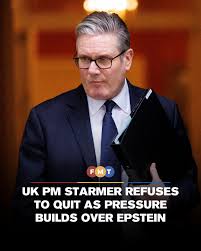Britain's Prime Minister Keir Starmer leaves 10 Downing Street in London, Monday, Feb. 9, 2026.(AP Photo/Alberto Pezzali)
U.K. premier Keir Starmer insisted he would not "walk away" on Monday after a prominent ally demanded the prime minister quit for embroiling the British government in the Jeffrey Epstein scandal.
Senior ministers rallied around him over the most serious crisis yet of his stuttering 19-month premiership, as a rising far-right challenges him in the polls.
"After having fought so hard for the chance to change our country, I'm not prepared to walk away from my mandate and my responsibility," Starmer told Labour MPs at a crunch meeting where he was greeted with applause.
The beleaguered prime minister appeared defiant as he insisted he had "won every fight I've ever been in".
Earlier on Monday, Scottish Labour leader Anas Sarwar called on Starmer to resign for appointing Peter Mandelson as U.S. ambassador despite knowing he had maintained links to convicted sex offender Jeffrey Epstein.
"The distraction needs to end, and the leadership in Downing Street has to change," Sarwar told a press conference in Glasgow, becoming the most senior Labour politician to publicly urge Starmer to go.
Several cabinet ministers came out in support of the prime minister following several days of ominous silence, including his deputy David Lammy, foreign minister Yvette Cooper and finance minister Rachel Reeves.
Left-wing figurehead Angela Rayner and interior minister Shabana Mahmood, both tipped as possible replacements for Starmer, both said they had "full support" for their leader.
Departures
Earlier Monday, Starmer lost his second top aide in two days when his communications chief Tim Allan quit just months into the role.
On Sunday, Starmer's chief of staff, Morgan McSweeney, resigned for advising Starmer to make the contentious Mandelson appointment.
McSweeney's departure deprives the beleaguered U.K. leader of his closest adviser and the man who helped Starmer drag Labour back to the centre after succeeding leftist leader Jeremy Corbyn in 2020.
Starmer has had several communications chiefs in his short tenure, with staff departures, policy reversals and missteps an increasing hallmark of his administration, denting his popularity.
Conservative opposition leader Kemi Badenoch told BBC radio that Starmer's position was "untenable", while hard-right Reform U.K. leader Nigel Farage said the leader's tenure was "drawing to the close".
Labour has trailed Farage's anti-immigration party by double-digit margins in polls over the past year.
In his speech to Labour MPs, Starmer described the fight against Reform U.K. — which is hoping to make gains in upcoming key local elections — as the "fight of our lives".
Starmer sacked Mandelson in September last year after documents published by the U.S. Congress revealed the extent of Mandelson's relationship with Epstein following the financier's conviction in 2008.
Epstein killed himself in prison in 2019 while awaiting trial for sex-trafficking.
Documents released on January 30 by the U.S. government reignited the controversy, appearing to show that Mandelson leaked confidential U.K. government information to Epstein when he was a British minister, including during the 2008 financial crisis.
Police probe
Police are investigating Mandelson, 72, for misconduct in public office and raided two of his properties on Friday. He has not been arrested.
Starmer, a former human rights lawyer and top prosecutor for England and Wales, has apologised to Epstein's victims and accused Mandelson of lying about the extent of his ties to the financier during the vetting for his appointment to Washington.
The government is to release tens of thousands of emails, messages and documents on Mandelson's appointment, which could increase pressure on the prime minister and other senior ministers.
Several backbench Labour MPs, mostly from the left of the party who have never warmed to Starmer, have suggested that the prime minister should follow McSweeney out of the exit door.
But no clear successor has emerged and party rules make mounting a challenge difficult.
The party also faces a crucial by-election on February 28 and local elections in May, including in Scotland where Labour is expected to lose to the pro-independence Scottish National Party. The next general election is not due until 2029.Daily News






